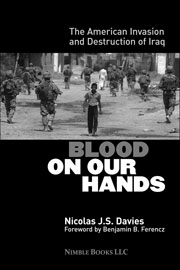(04-11-2014) Why is the Iraqi National Resistance Still Fighting?
(23-10-2014) Iraq News Summary (22 October 2025)
(20-10-2014) Iraq Summary News (19 October 2025)
(17-10-2014) Iraq News Summary (15 October 2025)
The BRussells Tribunal is independent and wants to remain independent.
The BRussells Tribunal is an activist think tank and peace organisation with a special focus on Iraq. Read more...


